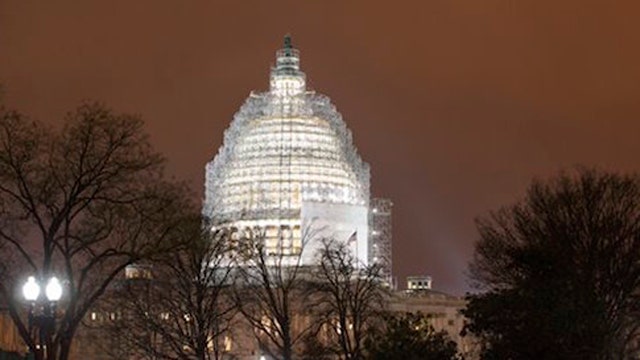Is Congress moving closer to another government shutdown?
Strategy Room: Ellen Ratner and Amos Snead on whether Republicans and Democrats can agree on a spending deal
House Speaker Paul Ryan said Wednesday that the chamber will now vote Friday on the $1.14 trillion end-of-the-year spending bill, breaking another deadline and forcing a second stop-gap resolution to keep the government running.
Late Tuesday, Ryan released the legislation, which was followed by some fellow House Republicans vowing a vote by Thursday.
Congress missed the original Dec. 11 deadline, resulting in the first stop-gap resolution, which originally was set to run out Wednesday night.
President Obama signed the emergency legislation to fund the government approved earlier in the day by the House of Representatives extending the temporary appropriations through Dec.
22.
Ryan, R-Wis., also said the legislation that extends the tax-break, which accompanies the omnibus spending bill, will be voted on Thursday. Both will then go to the Senate for final votes.
Despite dissenters in both parties, passage is likely and Obama's signature seems assured.
The spending bill includes the GOP proposal to lift a four-decades-old ban on exporting U.S. crude oil. It also includes increases in domestic and defense spending. And it increases the federal deficit by hundreds of billions of dollars by extending numerous, popular tax credits without paying for them.
Rep. Steve King, R-Iowa, said he was impressed with the work Congress had done on the tax-credit legislation and the $1.14 trillion omnibus spending bill. However, he said he was unsure about whether he could vote for either.
The final package also is expected to allow for the delay of three ObamaCare taxes -- the medical device tax, so-called “Cadillac tax” and health insurance tax -- congressional sources told Fox News.
The first two taxes -- on medical devices and high-end insurance plans -- were supposed to take effect in 2018, but would be delayed until 2020 if the deal passes as expected.
The third, a levy imposed on health insurers that typically is passed onto customers in the form of higher premiums, would be suspended for a year.
The deal, Congress' last major piece of unfinished business for the year, became the vehicle for countless long-sought priorities and odds and ends, including reform of visa-free travel to the U.S., renewable energy tax credits and health benefits for 9/11 first responders.
Democrats, despite their minority party status in Congress, exacted a price in the negotiations, thanks to Obama's veto pen and Republicans' need for their votes on the spending bill.
Democrats said they blocked more than 150 GOP-sought provisions, including language blocking federal money for Planned Parenthood, which would be certain to draw Obama's veto.
Final negotiations focused on horse trading around Democratic demands in exchange for lifting the 40-year-old ban on exporting crude oil.
Democrats succeeded in killing GOP attempts to roll back Obama environmental regulations, and obtained extensions of wind and solar tax credits, and permanent extension of the child tax credit.
White House Press Secretary Josh Earnest on Tuesday suggested that Obama will sign the oil-export bill despite previous threats to veto the measure.
The export ban was imposed during energy shortages of the 1970s but has been declared outdated by industry allies. Environmentalists say lifting it would amount to a giant windfall for the oil industry.
The final package ignores conservative demands for language clamping down on Syrian refugees entering the U.S.
Instead, it contains changes tightening up the "visa waiver" program that allows visa-free travel to the U.S. for citizens of 38 countries, including France and Belgium, where many of last month's Paris attackers were from.
Also in play are about 50 lapsed and expiring business and individual tax breaks that the two sides were looking to extend, in some cases permanently.
The price tag could mushroom to several hundred billion dollars or more over a decade, which would further add to federal deficits. The two sides agreed to make some expiring business tax credits permanent in exchange for doing the same to tax breaks for children, college students and lower-earning families.
Fox News’ Chad Pergram and The Associated Press contributed to this report.





